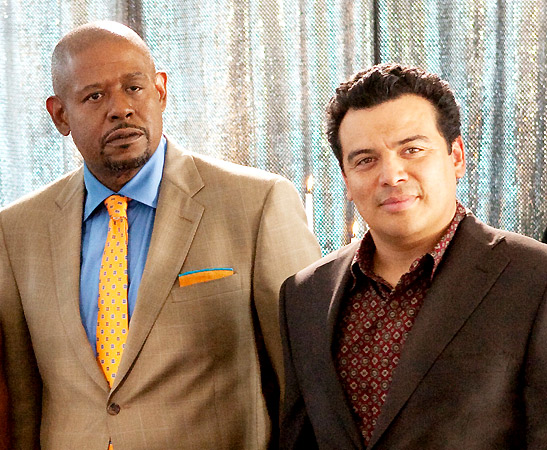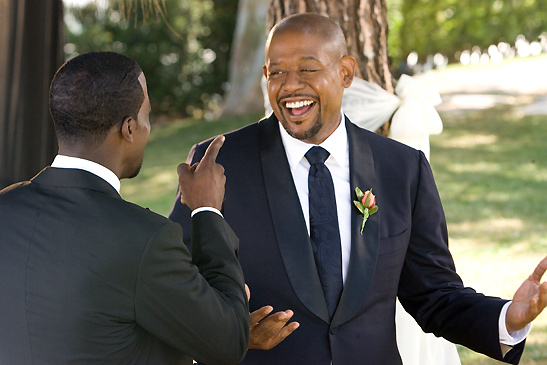 |
 |
|
 |

|
Forest Whitaker
TB: This film is a real departure from your other films which are much more serious. What attracted you to this script? Whitaker: When I was younger, I did some really intense roles like Bird and The Crying Game so my career went in that direction. This project started to happen at about the same time I hosted Saturday Night Live. I liked the Our Family Wedding script and thought it was fun, but very touching and something interesting to do. It explores racial and cultural differences and goes to the heart of everybody ultimately coming from the same place. TB: Did you enjoy the Saturday Night Live experience? Whitaker: I had blast. It was crazy. You know what, it’s a big release working on a movie like this. I mean it’s really relaxing. You still have to find your character and make him live in a specific universe. TB: Was there anything in the script where you thought you might be walking a fine line? Whitaker: I think the movie walks a fine line quite a few times with the Black and Latino stereotypes, but I think sometimes stereotypes have a core of truth, and the point is to get past those thoughts, images, and ideas and see the real person.
TB: Do you think weddings are mostly for the parents? Whitaker: I think in a lot of cases it appears that way. When you have to coordinate such a large event for so many people, some of whom don’t even like each other, you have to take a lot of things into consideration, such as seating the right people next to each other. There are so many different types of weddings from going down to City Hall or Las Vegas or little intimate ones. Some of them are for the couple, but I think the majority is a reflection of other people’s dreams. TB: Did you have a similar experience? Whitaker: My wedding was very small. We went to Jamaica and held the ceremony on the beach. We had around 40 guests and it was like a giant holiday for everybody. TB: Carlos Mencia who plays Miguel is a stand-up comedian. Were there any special challenges in working with him and did you improvise? Whitaker: I thought he was really centered as an actor and I loved working with him. We improvised a lot when it came to the back and forth banter. His character is really kind of a straight guy and is very sensitive, especially in those touching moments between he and his wife (Diana Maria Riva) and the conflict in letting his daughter Lucia go (America Ferrera). TB: You were born in Texas. Did your family move to California because of racism? Whitaker: My family didn’t move here because of racism. My dad moved here because he wanted to have greater opportunities. There was racism in the Texas town in which we lived. That particular part of Texas was very segregated. We lived on one side of the river and you never crossed over. It’s not very far from Jasper where eight years ago they were dragging people behind trucks. It’s a difficult place, but there are difficult places all over the country. TB: What’s your take on the struggle between the Latino and African-American gangs? Whitaker: There has been a struggle between the Latino and Black communities for a long time. Even when I was a kid that stuff was going on. Now it’s more intense. There have been attempts at truces between the gangs, but it’s difficult because so many different elements are involved. I narrated a gang documentary a year ago and I have met with gangs in different cities. TB: Are there any parallels in this film? Whitaker: This film is about inner personal racism. Color issues are many times about people trying to reach a higher key than what society has given them and their desire to feel like they’re the best. The Latinos have their own racism against each other from different racial groups and Blacks have different issues with each other, so it’s very complicated. It more of a tribal issue and that exists all over the world. TB: Do you think the film can bridge some of the animosities and does it have crossover appeal? Whitaker: I think there is crossover appeal. I don’t know if it’s going to make a dad say, ‘Go ahead and marry that guy.’ But maybe it will make someone stop for second to realize he might be a nice guy. It takes little steps to make all the pieces come together for a breakthrough. TB: Race issue aside, don’t most of us feel that no one is really good enough for our child? Whitaker: I agree. At the core of the story is that Miguel is losing his daughter Lucia and I’m losing my son Marcus (Lance Gross.) Our lives have to now be readjusted. I think about that with my own kid. He’s going off to college and I wonder if he going to come back, or am I going to see him just once year, or is he going to have kids? It’s normal behavior. TB: Why does your character choose to date women his son’s age? Whitaker: My character is damaged because his wife left him and he raised his son. He goes into those inappropriate relationships so he doesn’t have to get serious, and these young women aren’t looking to get married. Ultimately, the kids open his eyes because they show him that a relationship with an age appropriate woman (Regina King), will bring him happiness. TB: Your character is a bit anal in wanting everything to be in its proper place. Are you like that? Whitaker: Sometimes. If I’m working on stuff I like things organized in a certain way. As far as my character, that’s a way he tries to keep order in his universe and this new event breaks it up. TB: How does your Black Belt in Karate impact on your work? Whitaker: I would say that martial arts is one of my first big teachers of acting. I was taught how to reach a point, not just through a straight line, but to understand different angles and energy. I think that approach is one of the biggest influences impacting on my technique. When I did The Last King of Scotland, I worked intensely with my sefu (master) on the character – not on the words, but on fighting, because my character was extremely combative and aggressive and in some ways painful. My sefu taught me how to move through that aggression and pain and that was a big part in figuring out how to play the character. TB: When will you be directing again? Whitaker: I’m scheduled to direct and star in Satchmo in April of next year. TB: We look forward to that project. |
|
Thanks so much for those lovely tourism photos, especially of Ireland. I certainly enjoyed all the places you suggested, and am working towards my next vacation. Don’t forget Cuba. That’s an exciting place. Rosalie, Los Angeles
Enjoyed your article on Mira Sorvino. Such an interesting background – family, education, career and now human rights activist. I'm not a gossip mag fan so getting more meaty news about movie celebrities from you gives me hope that there are some inteligent life forms in Hollywood. Peter Paul, Pasadena, CA
Thank you, Bev. This reminded me to go see the movie, "An Education," which I had already almost forgotten about, having seen the preview a few weeks ago. I enjoy this actress quite a bit--she has a uniqueness about her and she pulls me in. I enjoyed this. Sandeee, Seattle, WA
Thank you Beverly,I really enjoyed reading about your intimate conversation with Forest, of whom I am a great admirer. I look forward to seeing the film "Our Family Wedding." Yoka, Westlake Village, CA
Thank you for the sending me the beautiful article you wrote about Ireland. We will use your recomendations for hotels in the Southern part. We plan to also go to Dublin and some other Northern cities so I will get some recommendations for these from others. After reading your article, I am getting more excited about going. I think we will be in Ireland for 8 days altogether. Leah Mendelsohn, Santa Monica, CA
Very much enjoyed Ms. Cohn's article about Munich, especially the visuals. Though it has been 25 years since my last visit, the piece brought back countless pleasant memories of the city and the people!! Many thanks. Lawrence, Los Angeles * * * Marianplatz and that general area is truly one of the best Christmas celebrations in the world. Between that and Oktoberfest (which I can only imagine) Munich is one of the greatest cities in the world for major annual events. Christopher Dale, New York, NY
Hi Bev, you have done some wonderful pieces on some great celebs...Great work. The travel articles are just wonderful too. Scott Mueller, Huntington Beach, CA
Your great Zurich article makes me want to go there for the holidays! I love the photos, too, especially the ones of you in the sleigh, the view over the houses and the zoo! Anna Marie, Santa Monica, CA * * * Lovely article! As a European, and having been to Zurich (albeit in summer) I can vouch for this lovely city. Great pictures, too! Helene Robins, Santa Monica, CA
Hi Bev, Nice review, nice seeing you, nice website interface "...Talk to Bev" - Enjoy your Thanksgiving! Richard D. Kaye, Marina del Rey, CA
Hi Bev, Your interview with John Cusack is very interesting. I always wondered why these actors/actresses always get top billing when really, if you think about it, the real work come from the animators, writers and tech whizzes who spend far more hours on the movie than those actors. I know, I know, it's the all about marketing. The names of these actors are what bring in the big bucks. Still, I think these actors are way overpaid for the "little" that they do. I remember that once upon a time, the early animation classics never mentioned the voices behind the characters. I think it was only later when Walt Disney tapped into the voices of known celebrities like Walter Matthau in the Jungle Book or Zsa Zsa Gabor in The Rescuers that the voices became a marketing magnet. Keep up the good work. I enjoy your interviews as you peer into the lives of the Hollywood celebrities. Peter Paul of South Pasadena, CA
|
This site is designed and maintained by WYNK Marketing. Send all technical issues to: support@wynkmarketing.com

|













